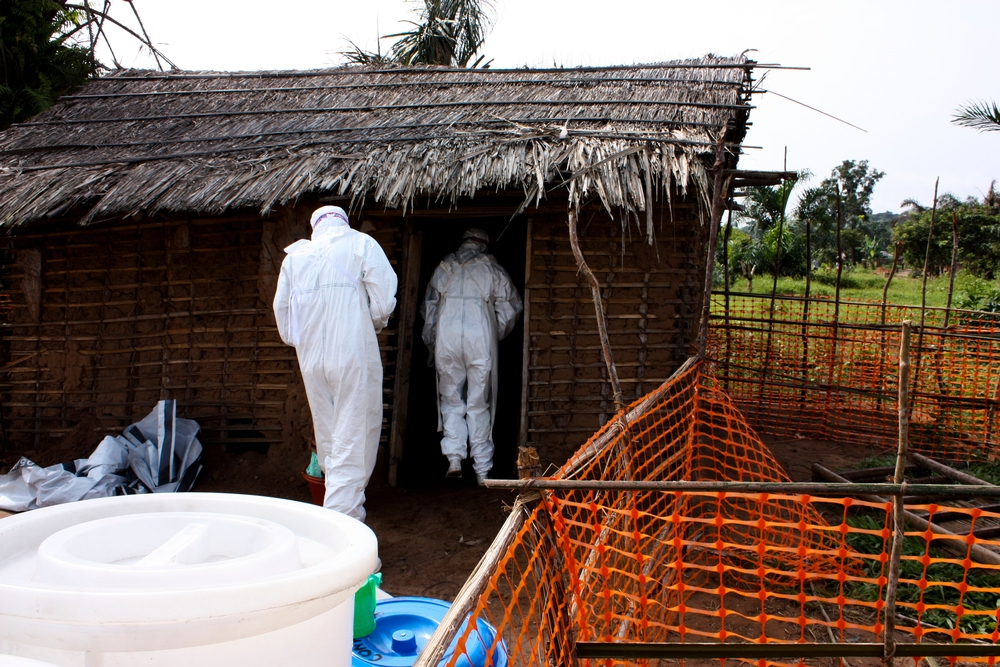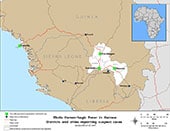Biological Alert:
31.03.2014
Ebola Outbreak in Guinea has been labeled 'Unprecedented' by Doctors Without Borders (MSF).
It is spreading to Senegal and the recent suspected case in Canada has since been proven negative.
More tonight on #USAEBN News Hour MON 6p EST www.blogtalkradio.com/USAEBN
#Ebola #HemorrhagicFever
Guinea: Mobilisation against an unprecedented Ebola epidemic
Conakry / Brussels / Geneva, 31 March 2014 – With eight confirmed cases of Ebola reported in the capital Conakry, Médecins Sans Frontières (MSF) is facing an unprecedented epidemic in terms of the distribution of cases now scattered in several locations in Guinea.
“We are facing an epidemic of a magnitude never before seen in terms of the distribution of cases in the country: Gueckedou, Macenta Kissidougou, Nzerekore, and now Conakry,” said Mariano Lugli, coordinator of MSF's project in Conakry. - MSF
Ebola outbreak in Guinea 'unprecedented' - MSF
 |
| It took authorities in Guinea six weeks to identify the disease - AFP |
The Ebola outbreak that has killed 78 people in Guinea is "unprecedented", a medical charity has said.
An official with Medecins Sans Frontieres (MSF) said the
spread of the disease across the country made it very difficult to
control.The West African state is facing a battle to contain the outbreak after cases were reported in areas that are hundreds of kilometres apart.
Ebola is spread by close contact and kills between 25% and 90% of victims.
"We are facing an epidemic of a magnitude never before seen in terms of the distribution of cases," Mariano Lugli, a co-ordinator in Guinea for the aid group said.
"This geographical spread is worrisome because it will greatly complicate the tasks of the organisations working to control the
epidemic," Mr Lugli added.
 |
| The outbreak of Ebola had centred around Guinea's remote south-eastern region of Nzerekore but it took the authorities six weeks to identify the disease. It has now spread to neighbouring Liberia, as well as Guinea's capital, Conakry, which has a population of two million people. |
Senegalese singer Youssou Ndour cancelled a concert in Conakry on Saturday because of the outbreak.
Although he had already travelled to the city, he told the BBC it would not be a good idea to bring hundreds or thousands of people together in an enclosed area.
Figures released overnight by Guinea's health ministry showed that there had been 78 deaths from 122 cases of suspected Ebola since January, up from 70.
Of these, there were 22 laboratory confirmed cases of Ebola, the ministry said.
Liberia has recorded a total of seven suspected and confirmed cases, including four deaths, the World Health Organization (WHO) said.
Liberia's Health Minister Walter Gwenigale on Monday warned people to stop having sex because the virus was spread via bodily fluids.
This was in addition to existing advice to stop shaking hands and kissing.
The BBC's Jonathan Paye-Layleh in Monrovia, the capital of Liberia, says residents are increasingly concerned and many supermarket workers are wearing gloves as a precaution.
The first two Liberians confirmed as dying from Ebola were sisters, one of whom had recently returned from Guinea.
Sierra Leone has also reported five suspected cases, none of which have been confirmed yet, while Senegal, another neighbour of Guinea's, has closed its land border.
Outbreaks of Ebola occur primarily in remote villages in Central and West Africa, near tropical rainforests, WHO says.
Related Stories
Ebola Hemorrhagic Fever
Outbreak of Ebola in Guinea - CDC
At a Glance:
- Suspected Case Count: 103
- Suspected Case Deaths: 66
- Laboratory Confirmed Cases: 15
Highlights
- As of March 27, 2014, the Guinea Ministry of Health announced a total of 103 suspect and confirmed cases of Ebola Hemorrhagic Fever, with 66 deaths (including 4 health care workers), in the districts of Guékédou, Macenta, Kissidougou, and for the first time today, Conakry, the capital. (See map.)
- 15 cases have been confirmed by laboratory testing at the Institut Pasteur in Lyon, France, the Bernhard-Nocht Institute of Tropical Medicine, Hamburg, Germany, and the Institut Pasteur team in Conakry, Guinea, to be positive for Ebola virus infection.
- Among the suspected and confirmed cases above, 4 were laboratory confirmed in patients in Conakry, the capital.
- Genetic analysis of the virus indicates that it is most closely related (98% match) to Zaire ebolavirus last reported in 2009 in the Democratic Republic of the Congo.
- The Guinean Ministry of Health is working with WHO, MSF (Doctors without Borders/Médecins sans Frontières) and other national and international partners to investigate and respond to the outbreak.
Outbreak Update
March 27, 2014
According to the World Health Organization (WHO), the Ministry of Health (MoH) of Guinea has reported 4 laboratory confirmed cases of Ebola hemorrhagic fever (EHF) in the capital of Conakry, with a fifth suspected case without laboratory confirmation. Suspected and confirmed cases of EHF have also been reported in three southeastern districts of Guinea: Guekedou, Macenta, and Kissidougou. As of March 27, 2014 a total of 103 suspected cases, including 66 deaths (case fatality ratio: 64%), have been reported in Guinea. Reports of suspected cases in neighboring countries are being investigated: Liberia reported to the WHO 8 suspected cases, including 6 deaths, in individuals with recent travel history to Guinea. Sierra Leone has reported 6 suspected cases, including 5 deaths. Médecins sans Frontières (MSF/Doctors without Borders) is helping the Ministry of Health of Guinea in establishing treatment and isolation centers in the epicenter of the outbreak. The Institut Pasteur in Lyon, France, the Institut Pasteur in Dakar, Senegal and the Bernhard-Nocht Institute of Tropical Medicine in Hamburg, Germany are a few of the laboratories collaborating to test samples. To date, 15 cases have been laboratory confirmed by PCR for Ebola virus. CDC is in regular communication with its international partners WHO and MSF regarding the outbreak, to identify areas where CDC subject matter experts can contribute to the response.Based on WHO update, March 27, 2014
Outbreak Update
March 26, 2014
According to the World Health Organization (WHO), the Ministry of Health (MoH) of Guinea has reported an outbreak of Ebola hemorrhagic fever in three southeastern districts: Guekedou, Macenta, and Kissidougou. Reports of suspected cases in the neighboring countries of Liberia and Sierra Leone are being investigated. In Guinea, a total of 86 suspected cases, including 60 deaths (case fatality ratio: 69.7%), had been reported as of March 25, 2014. Laboratory results from the Pasteur Institute in Lyon, France confirm Zaire ebolavirus as the causative agent. Médecins sans Frontières (MSF/Doctors without Borders) is helping the Ministry of Health of Guinea in establishing treatment and isolation centers in the epicenter of the outbreak. CDC is in regular communication with its international partners WHO and MSF regarding the outbreak, to identify areas where CDC subject matter experts can contribute to the response.Initial Announcement
March 25, 2014
According to the World Health Organization (WHO), the Ministry of Health (MoH) of Guinea has reported an outbreak of Ebola hemorrhagic fever in four southeastern districts: Guekedou, Macenta, Nzerekore and Kissidougou. Reports of suspected cases in the neighboring countries of Liberia and Sierra Leone are being investigated. In Guinea, a total of 86 suspected cases, including 59 deaths (case fatality ratio: 68.5%), had been reported as of March 24, 2014. Preliminary results from the Pasteur Institute in Lyon, France suggest Zaire ebolavirus as the causative agent. Médecins sans Frontières (MSF/Doctors without Borders) is helping the Ministry of Health of Guinea in establishing treatment and isolation centers in the epicenter of the outbreak. CDC is in regular communication with its international partners WHO and MSF regarding the outbreak, to identify areas where CDC subject matter experts can contribute to the response.Ebola Virus Alert Canada 140324 - USAEBN
Ebola Virus has been detected in Canada. The Canada victim has recently
been in West Africa, where the Ebola virus is spreading. The victim has
been placed in isolation, in critical condition. The possibility of the
virus spreading in Canada in very slim.
Besides Canada Ebola Virus has also been reported in the Philippines.
No Death have been reported outside of West Africa, but currently the
death rate in Africa is about 45%. The Ebola Virus normally has a death
rate between 25 to 90%. Currently there is no cures for Ebola Virus
The Ebola Virus causes severe viral hemorrhagic fever (VHF) outbreaks in humans. This virus first appeared in 1976.
Transmission
Ebola is introduced into the human population and spreads through
contact with the blood, secretions, organs or bodily fluids of infected
animals or humans. Health Care workers are at high risk of being
infected.
Signs and Symptoms
- Ebola Virus is often characterized by
- sudden fever
- intense weakness
- muscle pain
- Headache
- Sore throat
Followed by
- Vomiting
- Diarrhea
- Rash
- Impaired kidneys
- Decrease liver function
- Internal / external bleeding (in some cases)
The incubation period is between 2 to 21 days. Then the persons body fluid become the means of transmission.
There is no known cure for Ebola Virus!!
Prevention
Since the route of transmission is bodily fluids, then normal blood bourne pathogen preventions should be adhered to.
- Wearing of rubber gloves
- N95 respirators
- Hand washing
If you believe you have come in contact with someone infected with Ebola, seek medical care immediately.
More from the CDC:
Prevention
The prevention of Ebola HF presents many challenges. Because it is still unknown how exactly people are infected with Ebola HF, there are few established primary prevention measures.When cases of the disease do appear, there is increased risk of transmission within health care settings. Therefore, health care workers must be able to recognize a case of Ebola HF and be ready to employ practical viral hemorrhagic fever isolation precautions or barrier nursing techniques. They should also have the capability to request diagnostic tests or prepare samples for shipping and testing elsewhere.
 |
| Luis Encinas/MSFAn isolation unit for suspected cases during a previous Ebola outbreak in Democratic Republic of Congo, 2009. - MSF |
- wearing of protective clothing (such as masks, gloves, gowns, and goggles)
- the use of infection-control measures (such as complete equipment sterilization and routine use of disinfectant)
- isolation of Ebola HF patients from contact with unprotected persons.
CDC, in conjunction with the World Health Organization, has developed a set of guidelines to help prevent and control the spread of Ebola HF. Entitled Infection Control for Viral Hemorrhagic Fevers In the African Health Care Setting
- recognize cases of viral hemorrhagic fever (such as Ebola HF)
- prevent further transmission in health care setting by using locally available materials and minimal financial resources.
Source Report:
 |
| WEIN ViraMask N99 w/ViraSeal - 5pk - NebShip Shop |
 |
| SOL Origin Survival MultiKit - eBay |
Check Out Education Podcasts at Blog Talk Radio with USA Emergency Broadcasting Network on BlogTalkRadio
MP Off Grid Living/EV Page
 | |
| fb: Madtown Preppers Page +Madtown Preppers @MadtownPreppers |
Madtown Preppers Alerts are for informational use only. These
alerts purpose is to inform you of news events in order for you to
adjust your family preparedness programs. We believe that
knowledge is power and in order for you to make informed
decisions, we try and bring you verified information, not to
increase fear but to inform you. We do not endorse any of the
sources we link to in any article.



No comments:
Post a Comment